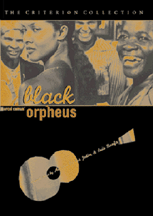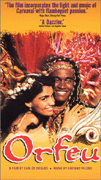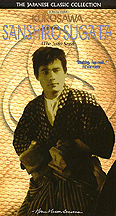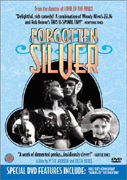
4/27/02
"Life Of Brian" (1979)
We are all individuals!
"Sanjuro" (1963)
The playful sequel to Akira Kurosawa's well-known samurai thriller, Yojimbo. Here, the masterless ronin swordsman (played, of course, by Toshiro Mifune) drifts into another small town belegured by rival thieves, warlords and businessmen. He skillfully pits one against the other and lets the rats pick themselves off, one by one. Then, just when we start to wonder if Mifune's swordsman is in fact a fraud, he fells a dozen thugs in the blink of an eye. A fun, thoughtfully plotted, beautifully realized classic of the genre.

"Black Orpheus" (1959)
The classic film that brought Brazilian bossa nova to the world outside, this was a wry modernist update of the classical Greek myth of Orpheus and Euridyce, the star-crossed lovers whose passion could not be denied, even by all the powers of Hell. The film is adapted from a bold stage play written by Brazilian poet Vinicius De Moraes, who enlisted a then-unknown Antonio Carlos Jobim to compose the classic bossa tunes that stud the films soundtrack. In this version, Hell is a blend of the futurist modernism that created Brasilia, the sterile and unappealing new capital of Brazil, and the heedless bacchanalia of Carnaval; Vinicius's vision of the lower rings of Hades as a bureaucrat's office is a stroke of pure genius. I first saw this film when I was in high school; viewing it again as an adult steeped in Brazilian popular culture, I certainly got a lot more out of it. Although some Brazilians (prominently, Caetano Veloso) chafe at the fact that this version was directed by a European, director Marcel Camus, I think it's still safe to say that it is a brilliantly made film. Heavy on the textual symbolism and, yes, a bit voyeuristic in its depiction of the happy natives dancing to their catchy samba rhythms, but brilliant nonetheless. It also captures a moment in time -- Brazil's transition into a modern nation, and the heady days before the 1964 coup -- in a way that is precious and ineffable.

"Orfeu" (New Yorker, 1999)
Although Brazilians have long felt that the French film Black Orpheus was condescending and did a disservice to their culture, Carlos Diegues' modern update is a poor choice as a replacement. It's ham-fisted and agit-proppish to a distracting degree, although doubtless reveals more about the Brazilian favelas (slums) that most movies ever will. In this version, Orfeu is a Caetano Veloso/Gilberto Gil-style musical superstar who has chosen to stay living in the slums her grew up in, even though he is rich and famous and could easily break free of its crime-ridden confines.
4/24/02

"Sanshiro Sugata - The Judo Saga" (Toho, 1943)
Martial arts films have come a long way since this curious historical drama, the first feature film directed by the up-and-coming Akira Kurosawa. Filmed and edited during wartime, it dramatizes the story of the late 19th Century development of judo as a breakaway form of jiu-jitsu. Without the benefit of Hong Kong style wire-works or the flashy acrobatics of Bruce Lee, et al, the combat looks mostly like wrestling or sumo... Which, perhaps, back in the 1880s, it was. Takashi Shimura introduces his role as an older wise man, in custody over the spiritual growth of a younger firebrand; the plot has a bit of a Romeo and Juliet tone to it, as the young champion of judo falls in love with the daughter of a rival school's sensei. Fans who have seen Kurosawa's glorious later films will notice right away the relative lack of grace here, yet as a directorial debut this is pretty stunning and ably introduces the visual poetry and various themes that he would so ably explore in years to come. Also, military censors apparently mucked with the movie for various reasons, and interrupted the flow of the narrative (most notably in a couple of sequences deleted in their entirety and replaced by silent-movie style placards explaining the absent action, and in the ending, which seems rushed and inexplicable). Still, any Kurosawa fan will find this film quite rewarding.
"No Regrets For Our Youth" (Toho, 1946)
Kurosawa breaks with the onus of having worked under Japan's fascist government with this exposition-heavy political melodrama, detailing the suppression of the anti-militarist student movement of the 1930s, and Japan's descent into dictatorship. A classic love triangle plays out on a political stage; she prefers the romantic pro-democracy activist, and follows her heart in a way which recaptures lost Japanese honor and simplicity. It's also an interesting feminist parable, about a determined young woman who gives up social privilege to gain own independence. The film is rather talky and may lose those who don't have at least a passing familiarity with Japan's 1930s invasion of Manchuria, and the nation's inexorable march into World War II. But even when applying himself to reverse propaganda, Kurosawa is capable of delicious cinematic poetry. Worth checking out, although it's admittedly no Ran.
4/18/02

"Stray Dog" (Toho, 1949)
This Japanese film noir was one of Akira Kurosawa's earliest films, starring (a very young!) Toshiro Mifune as a police detective whose pistol has been stolen and fenced on the black market. The rookie cop carries a samurai-like sense of personal responsibility for the crimes that are committed with his gun following his lapse in vigilance; this sense of honor is not shared by his fellow officers, who hold a more pragmatic, modern view of things. Slow moving in the first half, the film picks up steam at the end, climaxing in as grim a showdown as any American movie of the same era. What takes so long is Kurosawa's presentation of pre-corporate, postwar Japan, which, with its drug use, prostitution and ramshackle, peeling plaster slums is very different from the ultramodern, sleek image of Japan today. The transition into an American-oriented popular culture is extensively explored, from the jazz music and Hawaiian tunes that flood through the streets to a (somewhat belabored) day at the baseball field. Takashi Shimura, who later played the philosophically-minded leader of The Seven Samurai, also stars, as the veteran detective who shows Mifune the ropes. Kurosawa devotees will want to check this out -- it's worth hanging in there for the plot to develop.
"Donnie Darko" (2001)
Kind of a cool is-this-real-or-isn't-this? horror-ish art film, which mixes oh-god-what-happened-to-our-little-baby parental angst with Kids- style teenage nihilism. James Gyllenhaal is fascinating to watch, a little on the Toby McGuire-lite side, but also completely convincing as one of those sloe-eyed, remotely psychotic young guys that you marvel is able to get a date at all. The ending is satisfyingly head-trippy. I liked this flick.
4/14/02
"Road To Singapore" (Paramount, 1940)
The first of the much-vaunted Road To series, and an inkling of things to come... Beset on all sides by would-be wives, Bob Hope and Bing Crosby skip town to form an Asian branch of the He-Man Woman-Haters Club, predictably getting sidetracked by drippy Dorothy Lamour (is it just me, or is her likeness to Katie Holmes... check her out in profile... a little eerie?) Anyway, the plot is paper thin, the pacing is sluggish and the gags are as flat as the tunes by songwriter Johnny Burke. It's kind of goofy seeing Hope in a supposedly manly-man role, but maybe that's just in hindsight. Most significantly, this marks the beginning of Crosby's descent into unmitigated pop culture corn... It's a so-so oldie; better that you should stick with Waikiki Wedding, which at least has some cool music.
"The Tunes Of Glory" (1960)
A great movie. Alec Guinness stars as a boisterous, bullying, back-slapping he-man commander of a remote outpost of the Scottish Highlands Brigade. He's just been supplanted as commander of the garrison, replaced by a prissy, high-strung aristocrat whose grandfather once ran the regiment, back in the day. Their battle of wills, and the reactions of the officers and soldiers under their command, are fascinating and exquisitely rendered. Plus, it's a treat to see Guinness with his hair dyed red, acting against character as an abrasive, morose Scot. Definitely worth checking out.
4/11/02
"Spy Game" (2001)
Robert Redford and Brad Pitt try to out-blonde and out-handsome each other in this muddled spy thriller. I think someone must have cut out the twenty minutes during which the plot makes sense and we care at all about any of the characters...
4/10/02

"Forgotten Silver" (1997)
Peter Jackson's hilarious spoof mockumentary about New Zealand's great unknown film pioneer, Colin MacKenzie, a directorial genius who would have eclipsed Cecil B. DeMille and D.W. Griffith, had it not been for the cruel hand of fate. The measured narrative tone and doctored, Zelig-like "archival" footage are flawless. The VHS version also includes the amazing short film, "Signing Off," about the DJ nightmares that are all-too-common to those of us who have done a bit of radio in our times. Both films have to be seen to be believed...
"The Believers" (MGM, 1987)
Martin Sheen stars in this almost-scary voodoo flick. The pacing is just a little slow, and they take too long to s...h...o...w... y...o...u... e...v...e...r...y...t...h...i...n...g... in the santeria and brujeria rituals involved. Still, it's an okay horror flick. But to think: later he became President Bartlett!
4/08/02
"Jeepers Creepers" (2001)
Actually not a bad teen-oriented scary movie. Not too self-referential or inside-jokey, and creepy without too much explicit gore. A lot of the scariness just plays off of our innate dreads and loathings; our attention is also held fast by endless examples of ill-advised "stupid" behavior and various plot holes. A pleasantly unresolved, but rather decisive ending. Bring on the sequel!
4/06/02
"The Steel Helmet" (1951)
Even though it was directed by the great Sam Fuller, this low-budget, psychologically-oriented Korean War movie lacks emotional oomph, and isn't really that big in the bang-pow department either. Gene Evans stars as a prototypical cigar-chomping battle-hardened infantry sergeant who dodges a particularly grim death as the movie begins. Soon, the grizzled loner hooks up with a rag-tag outfit populated with various Characters: the loyal Asian American, the loyal American Negro, a couple of colorful goofballs and an officer he (naturally) has to lock horns with until combat brings mutual respect. It's a potboiler, and along with the cheap production values, isn't terribly engaging. The plot perks up mildly when a Red Chinese prisoner tries to needle his captors -- particularly on civil rights issues -- but the politics of the script are a bit muddled, and neither the Asian or the African-American soldiers manage to effectively explain their loyalty to the old Stars and Stripes. Of some interest historically, but not a very good film.
"When Trumpets Fade" (1998)
This made-for-cable WWII shoot-em-up came out around the same time as Spielberg's Saving Private Ryan, and while it lacks the artistic depth of that film, it does give some nice glimpses into the visceral horror of on the ground warfare. The focus is the bloody and all-but-forgotten fight over Germany's Hurtegen Forest, described in the soldiers in the film as "The Death Factory." Our hero is a self-serving survivor whose talent for combat leads to several unwanted battlefield promotions -- and, of course, to a restoration of his deadened sense of humanity and heroism. The forced modernism of the script -- particularly the gratuitous cursing and '90s-ish performances -- threaten to upend the film in the opening sequences, but it gathers steam and a sense of dread. Worth checking out. The only real gaping hole is country singer Dwight Yoakam's dull, scenery-chomping cameos as a bullet-headed, unsympathetic officer. It's not that bad of a performance, but I really think Dwight should re-think this whole acting career thing: his charisma doesn't translate well on screen.
4/05/02
"The Professionals" (Columbia, 1966)
Another western. This has the promising markings of a pleasantly formulaic film -- four men, each a specialist in his field, are hired as mercenaries to do a big job in Zapata-era Mexico. Unfortunately, the movie is plodding and emotionally uninvolving. Robert Ryan was too old for his role; Lee Marvin, Woody Strode and Burt Lancaster are all adequately cool, but nothing really catches fire here. It's kind of nice to see the aged, yet ever-oily Ralph Bellamy in a later role as the tycoon who sends the heroes off on their mission; Claudia Cardinale also stars as a Raquel Welch boobalike. Some stuff blows up and todos los banditos hablan espanol. But no big whoop, really.
"Purgatory" (Turner, 1999)
Does mighteous make righteous? That's the question in this odd, mystically allegorical made-for-TV western... A gnarly crew of outlaws wind up in a mysteriously peaceful border town, where borderline bad guys are given a chance at redemption by the powers that be. It gets a little syrupy in the second half, but I was into it. Always nice to see Sam Shepard flaunt his grizzle.
4/01/02
"Yojimbo" (1961)
Awesome samurai film. But you knew that already.


Joe Sixpack's Film Blog
Main Film Index
Slipcue Main Index
Copyright 1998-2006 Slipcue.Com. All Rights Reserved.
Unauthorized use, reproduction or translation is prohibited.